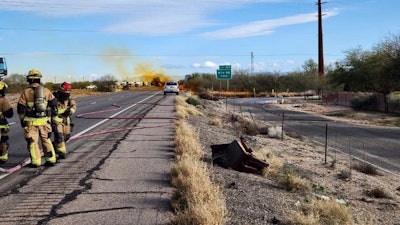
TUCSON, Ariz. (AP) — The deadly crash of a commercial tanker truck caused hazardous material to leak onto Interstate 10 outside Tucson on Tuesday, shutting down the key highway through Arizona and forcing evacuations near the accident.
Residents within a half mile (800 meters) were ordered to leave and those within a mile (1.6 kilometers) were told to shelter in place for several hours after liquid nitric acid was determined to be leaking from the tanker, the Arizona Department of Public Safety said.
The Tuesday afternoon accident happened on a stretch of I-10 southeast of downtown Tucson.
The shelter-in-place order was lifted Tuesday night but "those who have already been evacuated will remain evacuated," the agency said.
The driver of the truck was killed, the department said, but few other details were released.
The agency warned motorists in the Tucson area should anticipate impacts on their Wednesday morning commute in and around I-10.
"This will be an extended closure," it said in a tweet Tuesday evening.
The University of Arizona Tech Park was among the areas evacuated. Some schoolchildren in Rita Ranch were among those who sheltered in place, the Arizona Daily Star reported.
Nitric acid is used to make ammonium nitrate for fertilizers and in the manufacture of plastics and dyes.
The Centers for Disease Control and Prevention says nitric acid is a highly corrosive, colorless liquid with yellow or red fumes and can cause an acrid smell.
It says exposure to nitric acid can irritate the eyes, skin, and mucous membranes. Depending on the dosage, it also can also cause delayed pulmonary edema, pneumonitis, bronchitis, and dental erosion.






















